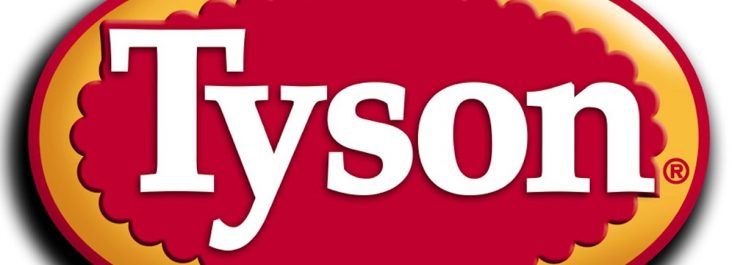Tyson Foods expected to report healthy quarterly income, but lawsuits persist
by November 16, 2016 5:25 pm 286 views

Tyson Foods has been a darling on Wall Street this year with share values rising 31.5% – and that’s after a recent setback from the onslaught of litigation filed against the Springdale-based meat company and its chicken competitors.
Analysts expect a strong fourth quarter report from Tyson Foods when it releases earnings early Monday (Nov. 21). The consensus estimate is net income of $1.15 per share, up 38.5% over the year-ago earnings of 83 cents a share. That equates to more than $420 million in quarterly profit for the three months ended Sept. 30. Revenue for the fiscal fourth quarter is projected to be $9.4 billion, 3.7% lower than a year ago. Lower top line sales relate to cheaper meat prices as supply outpaced consumer demand.
Wholesale chicken prices are lower than a year ago, according to the Georgia Dock Index. In the recent quarter whole bird prices were about 2% lower than a year ago. The highest premium cuts of chicken – boneless, skinless breast – are down 10% in price from a year ago. Leg quarter meat prices are down 30% from a year ago and wing prices averaged $1.48 per pound in the recent quarter, which is 7.5% lower than the wholesale prices a year ago.
This has been a solid year for Tyson Foods who last quarter raised its full-year earnings guidance range to $4.47-$4.57. For the full year net profit could tally $1.8 billion if Tyson Foods hits the mid range of its guidance. Wall Street expects Tyson could do a little better than that.
Looking at Tyson’s earnings track record the company managed to beat quarterly estimates in 8 of the past 12 earnings cycles. Tyson Foods CEO Donnie Smith forecast record profits in 2016 in February given higher operating margins the company achieved in its chicken and prepared foods segments with the branded business it acquired through Hillshire Farms.
Also working in Tyson’s favor are $175 million in lower grain costs compared with the same period in 2015. Tyson forecast an operating margin of more than 12% this year in its chicken business, double the margin it had just a few years ago.
The beef segment was also poised to do well as packer margins averaged between $150 and $175 per head through August rising to the $200 mark in September. The margins hit record levels for that time of year, according to M&R Capital. Live cattle prices dipped below $100 per head in October, spelling major losses for farmers, but fatter margins for packers able to secure kill stock at lower prices.
Tyson predicted its beef operating margin would be in the normalized range 1.5%-3% for the full year. Analysts believe Tyson’s margins were at the high end of that spectrum given the better packer margins through much of the quarter. Another positive for the beef segment in the recent quarter is China opened its market to U.S. beef imports.
The pork industry has seen issues around excess supply which collapsed hog prices through the early fall months. Packers had 3% to 4% more hogs to process in September leading to capacity concerns for manufacturing. With hog prices around a low $30 per hundredweight, packer losses are expected. Tyson, which primarily buys hogs and grows few through farmer contracts, has been said to have a solid pork business. Analysts believe the Tyson model likely mitigated some of the exposure other more vertically integrated processors experienced.
Tyson Foods’ prepared foods business could be wildcard for just how far Tyson exceeds expectations in the quarter. Tyson likely benefited from lower raw material costs which were evident in pork and chicken. Tyson continues to invest in this segment around technology innovation and new product launches which is expected to lower the operating margin in 2016. Tyson predicted operations would fall at the low end of the normalized range of 10% to 12% for the full year.
While Tyson’s full year earnings results have the potential to hit record status, there is a cloud that hangs over the company and its chicken competitors that are accused of collusion and price fixing by Maplevale Farms. Class Action litigation has ensued for conspiring to keep chicken prices higher in 2008, 2011 and 2012.
Tyson denies the allegations but analyst Tim Ramey, of Pivotal Research, downgraded Tyson after studying the lawsuit and potential impact. Ramey slashed his price target for Tyson shares from $100 to $40. Ramey said the lawsuit makes “compelling claims.” Other analysts such as Ken Goldman, though neutral on the stock, said any big dip in Tyson share prices should be a buying opportunity.
Tyson Foods shares (NYSE: TSN) closed Wednesday (Nov. 16) at $69.02, up 22 cents. For the past 52 weeks Tyson shares have ranged from $43.43 to $77.05.
